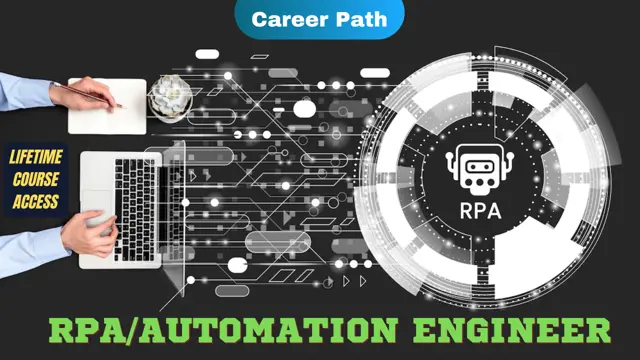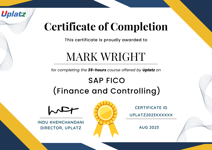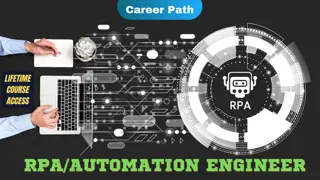
RPA and Automation Engineer Career Path
Self-paced videos, Lifetime access, Study material, Certification prep, Technical support, Course Completion Certificate
Uplatz
Summary
- Uplatz Certificate of Completion - Free
Add to basket or enquire
Overview
Uplatz provides this powerful and extensive Career Path program to help you become a RPA and Automation Engineer. It is a program covering all topics related to Robotic Process Automation (RPA) in the form of self-paced video tutorials. You will be awarded Course Completion Certificate at the end of the course.
RPA stands for Robotic Process Automation, which is a technology that uses software robots or "bots" to automate repetitive and rule-based tasks in business processes. RPA aims to streamline workflows, increase efficiency, reduce errors, and free up human employees from mundane tasks so they can focus on more strategic and value-added activities.
Key characteristics of RPA include:
Rule-Based Automation: RPA bots follow predefined rules and logic to perform tasks. They are particularly effective for tasks that have well-defined and repetitive steps.
User Interface Interaction: RPA bots interact with applications and systems through the user interface, mimicking human actions like mouse clicks and keyboard inputs.
No Coding or Minimal Coding Required: Many RPA tools offer a user-friendly, drag-and-drop interface, allowing non-technical users to create automation workflows without extensive coding knowledge.
Scalability: RPA can be scaled easily by deploying multiple bots to handle various processes concurrently.
Integration with Existing Systems: RPA can work with a wide range of applications and systems, including legacy systems, without requiring significant changes to the existing IT infrastructure.
Audit Trail and Analytics: RPA tools often provide detailed logging and analytics capabilities, allowing organizations to monitor bot performance and identify areas for improvement.
Common use cases for RPA include data entry and extraction, invoice processing, report generation, data migration, customer support, HR onboarding, and many more. RPA is widely used across various industries, including banking, finance, insurance, healthcare, and manufacturing.
Benefits of RPA include increased operational efficiency, cost savings, reduced processing time, improved accuracy, and the ability to operate 24/7 without human intervention.
It's essential to note that while RPA is a valuable tool for automating repetitive tasks, it is not a replacement for all human tasks. Instead, it works alongside human employees to enhance productivity and optimize business processes. Additionally, as with any technology implementation, careful planning, proper governance, and ongoing monitoring are essential to ensure successful RPA adoption within an organization.
Course media
Description
Roles & Responsibilities of an RPA Engineer
As an RPA engineer, your primary responsibility is to design, develop, deploy, and maintain Robotic Process Automation solutions within an organization. You will work with business analysts, process owners, and stakeholders to identify automation opportunities, gather requirements, and create efficient and scalable automation workflows. Here are some key roles and responsibilities of an RPA engineer:
Process Analysis: Collaborate with business analysts and process owners to analyze existing processes and identify potential candidates for automation. Understand the business requirements and process steps to design effective RPA solutions.
Bot Development: Design and develop automation workflows using RPA tools. This involves configuring bots to mimic human actions and interactions with applications and systems. You may need to handle various data types, automate decision-making processes, and work with APIs to integrate different applications.
Testing and Validation: Perform rigorous testing of RPA bots to ensure they work as intended and handle exceptions gracefully. Validate the accuracy and reliability of automation outputs and refine the automation workflows as needed.
Deployment and Monitoring: Deploy RPA bots to production environments and monitor their performance. Ensure that the bots are running smoothly and address any issues that arise during the execution of automation processes.
Maintenance and Support: Provide ongoing maintenance and support for RPA solutions. This includes identifying and resolving issues, updating bots to accommodate changes in the underlying systems, and managing version control.
Security and Compliance: Adhere to security best practices and ensure that RPA solutions comply with data privacy and regulatory requirements. Protect sensitive information and implement access controls for RPA bots.
Documentation: Create detailed documentation for RPA solutions, including process documentation, design specifications, user manuals, and troubleshooting guides.
To become an RPA engineer, consider following these steps:
Gain a Strong Foundation: Develop a solid understanding of programming concepts, especially in languages like Python, Java, or .NET. Familiarize yourself with automation technologies and process automation tools.
Learn RPA Tools: Acquire hands-on experience with popular RPA tools such as UiPath, Automation Anywhere, or Blue Prism. These tools offer free versions or trial versions that you can use for learning purposes.
Take RPA Training and Certifications: Participate in RPA training programs and consider obtaining certifications from RPA vendors. Certifications can help demonstrate your expertise and boost your credibility as an RPA engineer.
Practice on Projects: Create your own automation projects or contribute to open-source RPA projects to gain practical experience. Building real-world automation solutions will showcase your skills to potential employers.
Stay Updated: Stay informed about the latest trends and advancements in RPA by reading blogs, attending webinars, and participating in RPA communities and forums.
Seek Internships or Entry-Level Positions: Look for internships or entry-level positions in companies that use RPA. This will provide you with practical experience and a chance to work alongside experienced RPA professionals.
Network and Connect: Attend RPA-related events, conferences, and meetups to network with professionals in the field. Connect with RPA experts on LinkedIn and seek mentorship opportunities.
As you gain experience and expertise, you can progress in your career as an RPA engineer and take on more challenging and high-impact automation projects.
Who is this course for?
Everyone
Requirements
Passion and determination to achieve your goals!
Career path
- RPA Developer
- RPA Engineer
- RPA Architect
- Automation Engineer
- RPA Consultant
- RPA Manager
- RPA Team Lead
- RPA Program Manager
- RPA Director
- Software Engineer
- Software Developer
- Business Analyst
- Optimization Analyst
Questions and answers
Currently there are no Q&As for this course. Be the first to ask a question.
Certificates
Uplatz Certificate of Completion
Digital certificate - Included
Course Completion Certificate by Uplatz
Reviews
Currently there are no reviews for this course. Be the first to leave a review.
Legal information
This course is advertised on reed.co.uk by the Course Provider, whose terms and conditions apply. Purchases are made directly from the Course Provider, and as such, content and materials are supplied by the Course Provider directly. Reed is acting as agent and not reseller in relation to this course. Reed's only responsibility is to facilitate your payment for the course. It is your responsibility to review and agree to the Course Provider's terms and conditions and satisfy yourself as to the suitability of the course you intend to purchase. Reed will not have any responsibility for the content of the course and/or associated materials.



